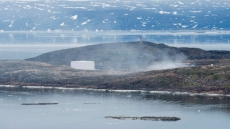TORONTO - Just two weeks ago the international president of Medecins Sans Frontieres insisted she didn't want to be quoted saying military hospitals should be deployed to West Africa's Ebola zone to bolster the woefully undermanned response efforts there — even though she herself raised the possibility.
Dr. Joanne Liu had just returned from touring treatment facilities MSF — also known as Doctors Without Borders — is operating in Guinea, Sierra Leone and Liberia, which are engulfed in the worst Ebola outbreak on record.
In an interview with The Canadian Press, she proposed tapping into military assistance, then quickly backed away when asked to be more explicit.
"I don't want you to quote me on that, because I'm going to get killed by MSF," Liu said, her comment revealing the tension that often exists between Doctors Without Borders and the world's armies.
So it is all the more indicative of how dire conditions are in West Africa that Liu called on governments to deploy this type of expertise Tuesday when she addressed a special Ebola briefing for the United Nation. Without this help, Liu said, this outbreak will not stop.
"To curb the epidemic, it is imperative that states immediately deploy civilian and military assets with expertise in biohazard containment," she told the UN.
"I call upon you to dispatch your disaster response teams, backed by the full weight of your logistical capabilities.... Without this deployment, we will never get the epidemic under control."
Desperate times call for desperate measures.
"This just tells you the extraordinary scale of this outbreak on the ground," says Dr. Ross Upshur, an ethicist and global health expert who teaches at the University of Toronto's Dalla Lana School of Public Health.
"If MSF is willing to countenance assistance from military sources with the provisos they've already put in place, that just tells you how serious the situation is on the ground."
The caveats Liu laid out were that any military assets and personnel deployed to the Ebola zone should not be used for quarantine, containment, or crowd control measures.
Michael Osterholm, head of the Center for Infectious Diseases Research and Policy at the University of Minnesota, applauded the MSF call, saying the military expertise with logistics — supply chains, transportation of goods and personnel — are needed in this situation.
"MSF continues to provide the most honest, blunt and informed assessment of where we're at. Not just in terms of how bad it is, but what do we actually really need to do to contain it?" Osterholm says.
Should Canada deploy DART, its Disaster Assistance Response Team, which is often sent in response to natural disasters abroad? As of late last week sources suggested a DART deployment was not being considered. And late Tuesday, the government suggested it hadn't been asked for this type of help — at least not by countries battling Ebola.
"Canada has not received a request from affected countries to send in the Disaster Assistance Response Team," department spokeswoman Beatrice Fenelon said via email.
Stephen Cornish, executive director of MSF Canada, says the organization had been in ongoing discussions with the Canadian government about assistance it could offer.
It and others must step up their efforts, he insists. And that means countries that have medically staffed field hospitals with isolation units should send them to West Africa.
The Ebola outbreak needs a stronger response than UN and non-governmental organizations are able to provide, Cornish says.
"It needs the response of states to have such independent capacities, and it needs their buy-in, their action, as well as the WHO's overall vision in order to co-ordinate this across West Africa. And we're really not seeing that," he says.
MSF has been calling for assistance for some time. The treatment facilities it has opened have been overwhelmed, treating far more patients than they have beds. The organization has said it can't staff more facilities and has asked others to step into the breach. So far it is still waiting.
Few countries have offered assistance, and those that have — like Canada — are providing support services such as running diagnostic labs. Useful, welcome, but not enough, Cornish says.
"We don't only need diagnostics and we don't only need education. We need increased bed capacity now."
"We're turning away patients who are sick because they're not sick enough. Because the wards are overflowing with patients," he says.
In some MSF treatment centres, medical personnel are no longer able to provide intravenous medication and can only offer palliative care.
"This is far from enough," Cornish says. "It's unjust to those who are sick, it's unfair to the medical personal that we're putting on the front line and it will be completely ineffective in getting ahead of this epidemic."
The World Health Organization says there have been at least 3,070 cases of Ebola in this outbreak and 1,552 deaths. Those figures exceed all previous known Ebola cases and deaths combined.





